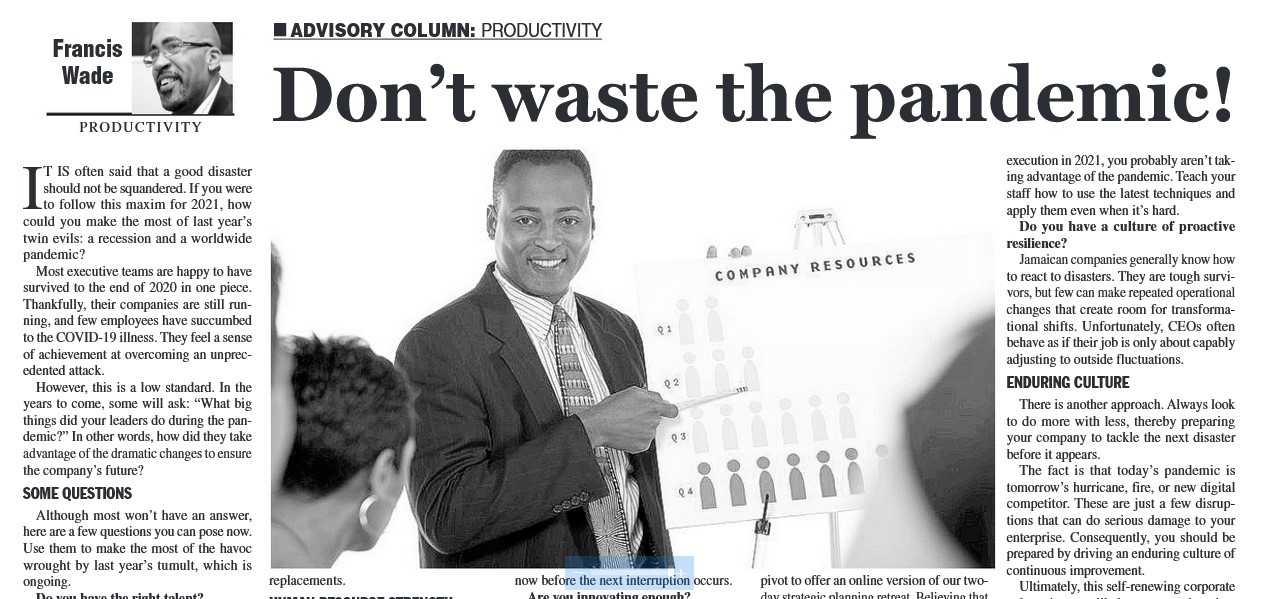It’s often said that a good disaster shouldn’t be squandered. If you were to follow this maxim for 2021, how could you make the most of last year’s twin evils: a recession and a worldwide pandemic?
Most executive teams are happy to have survived to the end of 2020 in one piece. Thankfully, their companies are still running and few employees have succumbed to the COVID-19 illness. They feel a sense of achievement at overcoming an unprecedented attack.
However, this is a low standard. In the years to come, some will ask: “What big things did your leaders do with the pandemic?” In other words, how did you take advantage of the dramatic changes underway to ensure the company’s future?
Although most won’t have an answer, here are a few questions you can pose now. Use them to make the most of the havoc wrought by last year’s tumult.
1) Do you have the right talent?
Under normal circumstances, most CEO’s and board chairpersons don’t like to rock the boat. While they may secretly want a company filled with top talent, they decide that it’s just not worth the fight. Instead, they settle for so-so standards, believing that you can’t have an organization of star performers.
Here’s another approach: the best football teams keep a list of potential replacements for every position. Looking forward, they plan for a time when each incumbent cannot improve his/her level of play. As such, no-one is granted an indefinite guarantee. Instead, these organizations continually scan the horizon for potential replacements.
Few local companies challenge their employees in this way: in fact, only a handful conduct proper performance reviews. This failure leaves them short – lacking the systems required to put top talent in seats. Consequently, when the time comes to make dramatic changes due to outside circumstances, they falter.
For example, in 2021 few companies escape the need for an urgent digital transformation. However, only a handful have the capacity needed to convert this strategic imperative into a reality. If your company has no active plan to upgrade its human resource strength, change your approach now, before the next interruption occurs.
2) Are you innovating enough?
Some time ago, an executive complained to me about the lack of a critical input to their company’s business. While it could be acquired locally, it was only available sporadically. We talked informally about taking strides to secure a steady supply.
Today, a decade later, the firm remains in the same spot. They failed to craft the strategy required, a weakness that COVID has “attacked”. If they had only taken the right steps at the right time, this would not be a concern. In fact, it would be an enormous source of competitive advantage leading to happier customers.
In my company, we were too slow in our pivot to offer an online version of our 2-day strategic planning retreat. Believing that COVID would pass in the near future, we waited…but now we expect companies to ask for lower cost, virtual retreats as a matter of course. We learned that innovation is easier to teach than to apply.
The truth is, when only a trickle of evidence is available, you need tremendous creativity to imagine what your customers and suppliers will need. Yet, there are standard, proven approaches to produce reliable, game-changing innovations. For example, use the Jobs to Be Done technique I mentioned in a Gleaner column from Nov 18 2016.
Here is a test – if you don’t have a list of practical innovations lined up for possible execution in 2021, you probably aren’t taking advantage of the pandemic. Teach your staff how to use the latest techniques and apply them even when it’s hard.
3) A Culture of Proactive Resilience
Jamaican companies know how to react to disasters: they are tough survivors. But few can make repeated operational changes which create room for transformational shifts. Unfortunately, CEO’s often behave as if their job is only about capably adjusting to outside fluctuations.
However, there is another approach: to always look to do more with less, thereby preparing your company to tackle the next disaster before it even appears.
The fact is that today’s pandemic is tomorrow’s hurricane, fire, or new digital competitor. These are just a few disruptions which can do serious damage to your enterprise. Consequently, you should be prepared by driving an enduring culture of continuous improvement.
Ultimately, this self-renewing corporate culture is more likely to succeed against rude surprises. It prepares your staff to tackle challenges effectively. This is the only way to ensure your firm’s success: the kind of place which sees the next disruption as an opportunity to transform itself for the better. Far from being wasted, it’s welcomed.

